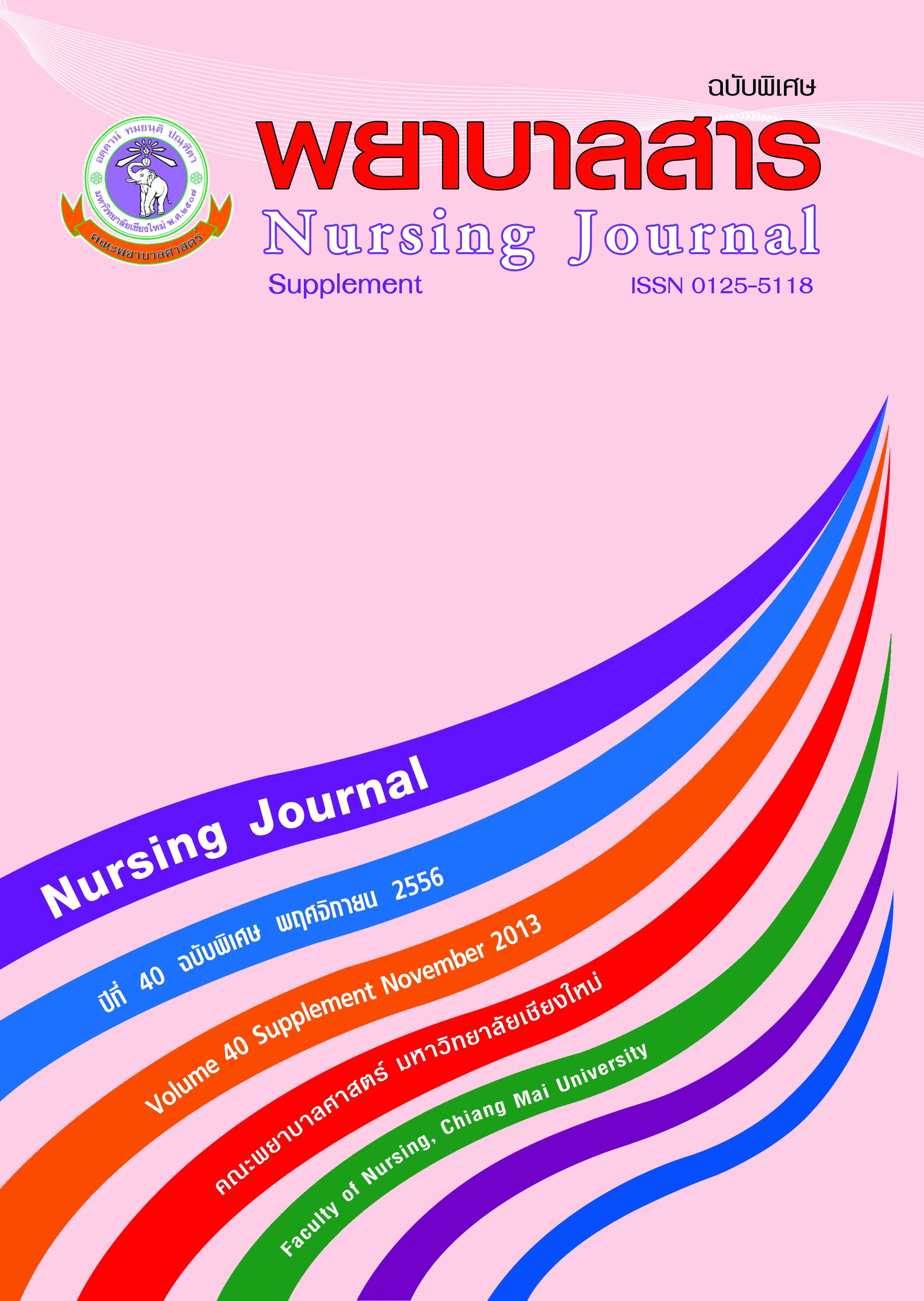ผลของการสนับสนุนการจัดการตนเองต่อพฤติกรรมการจัดการตนเองและอาการไม่สุขสบายในผู้ป่วยมะเร็งเต้านมที่ได้รับเคมีบำบัด
Keywords:
ผู้ป่วยมะเร็งเต้านมที่ได้รับเคมีบำบัด, การจัดการตนเอง, พฤติกรรมการจัดการตนเอง, อาการไม่สุขสบายAbstract
บทคัดย่อ
ผู้ป่วยมะเร็งเต้านมที่ได้รับการรักษาด้วยยาเคมีบำบัด เพื่อหวังผลในการทำลายเซลล์มะเร็งและป้องกันมิให้กระจายไปยังอวัยวะอื่น อย่างไรก็ตามผลของเคมีบำบัดทำให้ผู้ป่วยมะเร็งเต้านมเกิดอาการไม่สุขสบายจากภาวะแทรกซ้อนต่าง ๆ ดังนั้นจึงจำเป็นต้องพัฒนากิจกรรมเพื่อส่งเสริมการจัดการตนเองและลดอาการไม่สุขสบายการวิจัยกึ่งทดลองนี้มีวัตถุประสงค์เพื่อศึกษาผลของการสนับสนุน การจัดการตนเองต่อพฤติกรรมการจัดการตนเองและอาการไม่สุขสบายในผู้ป่วยมะเร็งเต้านมที่ได้รับเคมีบำบัด กลุ่มตัวอย่าง คือ ผู้ป่วยมะเร็งเต้านมที่มารับการรักษาด้วยการผ่าตัดและได้รับยาเคมีบำบัดที่หน่วยเคมีบำบัด แผนกผู้ป่วยนอก โรงพยาบาลเชียงรายประชานุเคราะห์ ตั้งแต่เดือนตุลาคม พ.ศ. 2554 ถึงเดือนมีนาคม พ.ศ. 2555 จำนวน 42 ราย แบ่งเป็นกลุ่มทดลอง 20 ราย และกลุ่มควบคุม 22 ราย กลุ่มทดลองได้รับความรู้เป็นรายกลุ่มและเข้าร่วมกลุ่มเพื่อฝึกทักษะการจัดการตนเอง จำนวน 4 ครั้ง ในขณะที่กลุ่มควบคุมได้รับการพยาบาลตามปกติ ประเมินผลภายหลังการสนับสนุนการจัดการตนเอง 8 สัปดาห์ โดยใช้แบบสอบถามพฤติกรรมการจัดการตนเองของผู้ป่วยมะเร็งเต้านมที่ได้รับเคมีบำบัด และแบบสอบถามการเกิดอาการและความรุนแรงภาวะแทรกซ้อนจากเคมีบำบัด วิเคราะห์เปรียบเทียบพฤติกรรมการจัดการตนเอง และอาการไม่สุขสบายระหว่างกลุ่มทดลองและกลุ่มควบคุมโดยใช้สถิติทดสอบแมนวิทนีย์ยู (The Mann-Whitney U Test) และเปรียบเทียบพฤติกรรมการจัดการตนเองและอาการไม่สุขสบายก่อนและหลังการสนับสนุนการจัดการตนเองของกลุ่มทดลองโดยใช้สถิติทดสอบวิลคอกซันจับคู่เครื่องหมายตำแหน่ง (The Wilcoxon Matched Pairs Signed-Ranks Test)
ผลการวิจัย พบว่า
กลุ่มทดลองที่ได้รับการสนับสนุนการจัดการตนเองมีคะแนนพฤติกรรมการจัดการตนเองโดยรวมสูงกว่ากลุ่มควบคุมอย่างมีนัยสำคัญทางสถิติ (120.5 vs 101.0 , p<0.001) และมีคะแนนอาการไม่สุขสบายต่ำกว่ากลุ่มควบคุมอย่างมีนัยสำคัญทางสถิติ (18.5 vs 30.5 , p<0.001) และกลุ่มทดลองมีคะแนนพฤติกรรมการจัดการตนเองเพิ่มขึ้นเมื่อเทียบกับก่อนทดลองอย่างมีนัยสำคัญทางสถิติ (120.5 vs 102.0, p<0.01) และมีอาการไม่สุขสบายลดลงเมื่อเทียบกับก่อนทดลองอย่างมีนัยสำคัญทางสถิติ (18.5 vs 25, p<0.01) การวิจัยครั้งนี้แสดงให้เห็นว่า การสนับสนุนการจัดการตนเองมีประโยชน์ต่อผู้ป่วยมะเร็งเต้านมที่ได้รับเคมีบำบัด และควรสนับสนุนส่งเสริมให้มีรูปแบบกิจกรรมการพยาบาลนี้ โดยจัดทำเป็นแนวปฏิบัติการพยาบาลทางคลินิกในการดูแลผู้ป่วยมะเร็งเต้านมที่ได้รับการรักษาด้วยเคมีบำบัด
คำสำคัญ: ผู้ป่วยมะเร็งเต้านมที่ได้รับเคมีบำ บัด การจัดการตนเอง พฤติกรรมการจัดการตนเอง อาการไม่สุขสบาย
Abstract
Breast cancer patients receiving chemotherapy aims to destroy cancer cells and preventcancer metastasis to other organs. However, breast cancer patients experience symptom distressfrom the treatment. Therefore, the development of activities to promote self-management behaviorsand alleviate symptom distress is needed. The purpose of this quasi-experimental research is toexamine effects of self-management support on self-management behaviors and symptom distresslevels in breast cancer patients receiving chemotherapy. Subjects were 42 breast cancer patientswho had undergone surgery and were receiving chemotherapy at Chiang Rai Prachanukroh Hospitalfrom October 2011 to March 2012. Twenty subjects were assigned to the experimental group and22 subjects to the control group. The experimental group received 4 group sessions of healtheducation and intervention to practice self-management skills, while the control group receivedstandard care. The evaluation, performed by the subjects 8th weeks after the completion ofintervention, consisted of the completion of two questionnaires: the Self-management Behaviors ofBreast Cancer Patients Receiving Chemotherapy Questionnaire, and the Severity of the Symptomsfrom Side Effects of Chemotherapy Questionnaire. The responses regarding self-managementbehaviors and symptom distress of the experimental and control groups were compared using theMann-Whitney U Test. In addition, pre and post intervention responses of the experimental groupwere analyzed using the Wilcoxon Matched Pairs Signed-Ranks Test.
The results of study
The results of this study revealed that the experimental group receiving the self-managementsupport showed statistically significant higher scores on self-management behaviors than those ofthe control group (p<0.01). For symptom distress, the experimental group demonstrated statisticallysignificant lower scores than those of the control group (p<.01). In addition, when comparing preand post intervention responses, the experimental group revealed statistically significant increasein the total scores of the self-management behaviors and symptom distress reduction after theintervention (p<0.01).
The findings of this study suggest that the self-management support enhances self-managementbehaviors and reduces symptom distress in breast cancer patients receiving chemotherapy. Thus, the researcher recommends the integration of nursing intervention in the form of self-managementsupport into the usual nursing care for breast cancer patients receiving chemotherapy.
Key words: Breast Cancer Patients Receiving Chemotherapy, Self-management, Self-managementbehavior, Symptom distress
Downloads
How to Cite
Issue
Section
License
บทความที่ได้รับการตีพิมพ์เป็นลิขสิทธิ์ของวารสารพยาบาลสาร
ข้อความที่ปรากฏในบทความแต่ละเรื่องในวารสารวิชาการเล่มนี้เป็นความคิดเห็นส่วนตัวของผู้เขียนแต่ละท่านไม่เกี่ยวข้องกับมหาวิทยาลัยเชียงใหม่ และคณาจารย์ท่านอื่นๆในมหาวิทยาลัยฯ แต่อย่างใด ความรับผิดชอบองค์ประกอบทั้งหมดของบทความแต่ละเรื่องเป็นของผู้เขียนแต่ละท่าน หากมีความผิดพลาดใด ๆ ผู้เขียนแต่ละท่านจะรับผิดชอบบทความของตนเองแต่ผู้เดียว






